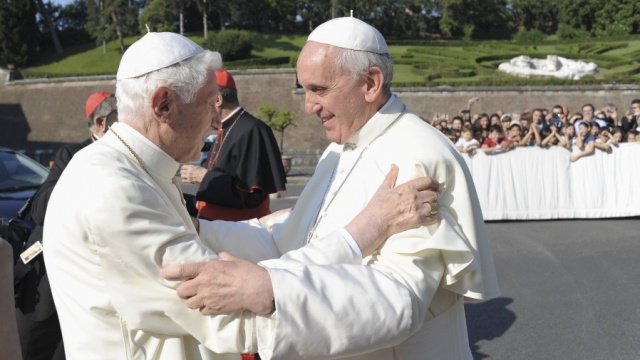

Receiving Laudato Si': remember no encyclical is released in a vacuum
Sebastian Gomes
Thursday, June 25, 2015

“I intend to pay tribute and to honour the memory of the great Pope Paul VI, revisiting his teachings on integral human development and taking my place within the path that they marked out, so as to apply them to the present moment.” (Caritas in Veritate 8)There have been other cases of popes writing encyclicals to mark an anniversary of an older encyclical or to re-present its fundamental principles in light of a new social or cultural situation. This is the practice of what Pope John XXIII called “reading the signs of the times,” that is, applying the fundamental truths and principles of the Catholic faith to the current reality. This is what Pope Benedict did with Caritas in Veritate and this is what Pope Francis has done with Laudato Si’. Today, the temptation to see only what is immediately in front of us hinders a proper reception of an important teaching like Laudato Si’. Twitter is not helpful in this regard. We cannot understand, process or reflect on everything immediately. On top of that, ignorance of the historic and thematic thread running through the modern encyclicals, especially the social encyclicals, is an injustice to the organic process of development within the body of magisterial teachings. It seems to me that this organic process is a constitutive quality of Catholicism and cannot be dismissed or ignored for ideological purposes. As Pope Benedict stated clearly in Caritas in Veritate:
The Church’s social doctrine is “a single teaching, consistent and at the same time ever new. It is one thing to draw attention to the particular characteristics of one Encyclical or another, of the teaching of one Pope or another, but quite another to lose sight of the coherence of the overall doctrinal corpus.” (12)When receiving and reading Laudato Si’ it would be good to ask, “what do I see here?” If the answer is merely “an acknowledgement that climate change is real,” or “a particular economic perspective,” or another singular issue that tends to draw attention and create controversy—something that can be tweeted—then perhaps greater appreciation is needed for what an encyclical is. Though it requires time and reflection, in reading Laudato Si’ we should see, not only Pope Francis’ enormous contribution to the ecological discussion, but also Caritas in Veritate, Populorum Progressio, Pope John Paul II’s consistent call for greater ecological action, Gaudium et Spes, the spirituality of St. Francis of Assisi, the Gospel. The beauty of Catholic teaching, which is really Catholic Tradition, is that it is organic and dynamic. It is alive. As Pope Benedict said, it is consistent and ever new. Because of this, Pope Francis can read the signs of the times in light of the Gospel. He can adopt the most up-to-date and authoritative science as part of his analysis of the ecological crisis. He can critique what is in reality an unjust economic system that excludes millions of people. He can show that creation is interconnected, theologically, biologically and socially. Pope John XXIII famously said, “It is not that the Gospel has changed: it is that we have begun to understand it better.” The contribution of the papal encyclicals to our understanding of the human person, the created world, modern civilization, the reality of God, the challenges we face together, is a living testament to that statement. Here we find Laudato Si’, the latest in a long line of reflections on the signs of the times, and one that will require of everyone a lengthy commitment to read, discuss, understand, and ultimately live.
 On Further Reflection
In the complex world of the 21st century there are more questions than answers. The challenge for the Church is to find new and effective ways of bringing the Gospel message into the conversation. For her part, the Church can act as a much needed voice of dialogue, reason and charity. On Further Reflection invites readers to go beyond the headlines to see the deeper realities affecting the church and society. Sebastian Gomes is a producer and correspondent for S+L TV.
On Further Reflection
In the complex world of the 21st century there are more questions than answers. The challenge for the Church is to find new and effective ways of bringing the Gospel message into the conversation. For her part, the Church can act as a much needed voice of dialogue, reason and charity. On Further Reflection invites readers to go beyond the headlines to see the deeper realities affecting the church and society. Sebastian Gomes is a producer and correspondent for S+L TV.Related Articles:
Category: Featured
Visit local pilgrimage sites this Jubilee Year
Thursday, January 30, 2025
 Maria Montemayor
Maria Montemayor
For the Jubilee of Hope, there are designated local pilgrimage sites in every country, and Canada is no exception. How is a local pilgrimage site determined? The local bishop can designate any parish, shrine, or basilica in his territory as a Jubilee Year pilgrimage site.
Creating Catholic streetwear
Thursday, January 9, 2025
 Maria Montemayor
Maria Montemayor
Fashion and clothing designed to draw people closer to God can inspire and even sanctify others. Nate Nagello, the CEO and owner of the Toronto-based Sanctified Collective, hopes the clothing he creates can provide opportunities for conversation, engagement, and evangelization.
When do you pray the Rosary?
Wednesday, December 4, 2024
 Maria Montemayor
Maria Montemayor
The Rosary is powerful: many graces can be bestowed upon those who pray it, and it can also offer special protection. Reciting the Rosary aloud in church and praying for the pope’s intentions can grant the supplicant a plenary indulgence.
What does it mean to be pro-life?
Tuesday, October 29, 2024
 Maria Montemayor
Maria Montemayor
This month on Behold, we have a special Lives Lived for Life episode featuring the stories of various pro-life advocates and individuals.
Review of The Forge
Thursday, August 22, 2024
 Maria Montemayor
Maria Montemayor
The movie is a testament to how a person’s life can transform in a year due to the power of prayer and the positive influence of a mentor.










